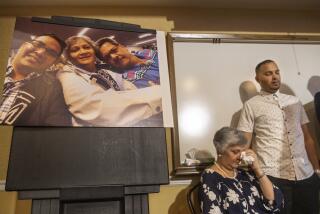2nd Jury Deadlocks on Punishment for Killer
For the second time this year, a Los Angeles County jury has deadlocked on whether a 35-year-old handyman should be executed for raping and murdering two women.
The vote Monday was 10 to 2 in favor of death for Kenneth Dean Hunt, who was convicted in March of first-degree murder and rape in the killings of Myra Davis, 71, and Jean Orloff, 60.
Orloff, an oral surgeon’s assistant, was found dead in her Westside apartment March 29, 1998. Ten years earlier, Davis was found strangled and raped in her home, also on the Westside. Davis worked as an actress and had appeared as a body double for Janet Leigh in the movie “Psycho.” Hunt had lived in the same neighborhood as both women.
The jury’s deadlock Monday prompted Superior Court Judge Jacqueline Connor to declare a second mistrial in the penalty phase. After convicting Hunt of the two murders, the earlier jury had deadlocked on the death penalty, with a vote of 11 to 1 in favor of capital punishment.
“It’s deja vu all over again,” said Assistant Dist. Atty. John Gilligan.
Prosecutors must decide whether to seek the death penalty a third time. In making that decision, they will consider the likelihood of a unanimous death verdict, the expense of another three-week trial and the wishes of the victims’ families. If the district attorney’s office opts against presenting the case again, Hunt will receive a sentence of life without the possibility of parole.
“He’s been convicted, and he will spend the rest of his life in prison regardless,” Gilligan said. “The question is whether the families have the strength to go on.”
A hearing on the matter was set for Sept. 6, when prosecutors said they will announce their decision.
The jury of eight women and four men deliberated for three days before reaching an impasse, attorneys said. The jurors told Judge Connor on Monday that they did not believe a verdict could be reached.
Hunt’s defense attorney, Mark Windham, said the jurors paid attention to his arguments that Hunt suffered from mental illness and an abusive childhood.
“It’s not really the facts that are at issue,” he said. “It’s the moral weight of the arguments. They accepted the argument that this case warranted mercy.”
Orloff’s daughter, Debby McAllister, said Monday that she was disappointed by the outcome.
“It’s frustrating and disheartening,” she said. “It’s been 3 1/2 years. We would really like this to be over.”
Hunt eluded arrested until a coroner discovered that Orloff did not die of natural causes, as authorities had earlier told relatives. A tip led police to Hunt, who was then connected to the long-ago killing of Davis. After a two-week trial, a jury convicted Hunt in March of murdering both women.
During closing arguments in the second penalty trial, Gilligan argued that Hunt took advantage of elderly, vulnerable people and deserved to die for his crimes. Hunt had already served time in prison for manslaughter in the death of another of his neighbors, Bernard Davis, 76.
“Mr. Hunt has committed the worst crimes a man can commit,” Gilligan said. “He has killed and killed again and killed again. How many bodies does it take?”
Defense attorneys asked jurors to have compassion for Hunt, who they argued was abandoned, abused and institutionalized during childhood. Windham also told jurors that Hunt suffered from a sexual behavior disorder that prevented him from controlling his actions.
“He wasn’t born violent, but something sure changed that,” he said. “We’re here because nobody intervened in this isolated, abusive family.”
Windham said Hunt should pay a price for his crimes, but that life in prison without parole is enough.
More to Read
Sign up for Essential California
The most important California stories and recommendations in your inbox every morning.
You may occasionally receive promotional content from the Los Angeles Times.










